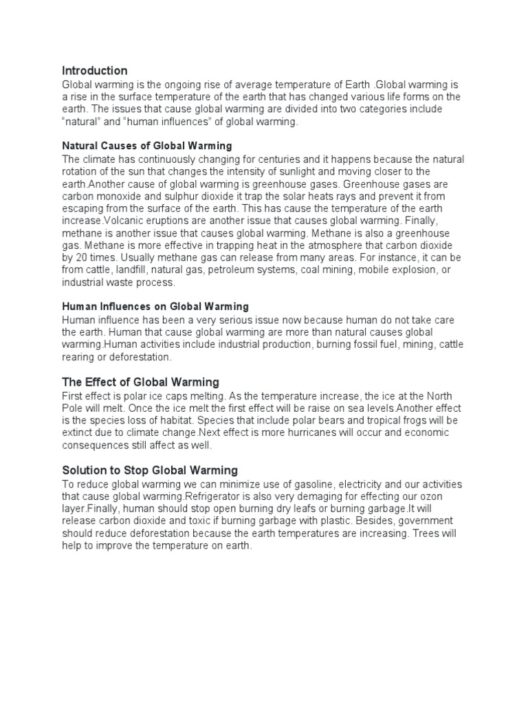As the impacts of climate change become increasingly evident, a critical question arises: what do scientists deem necessary to mitigate this pervasive threat? Understanding their insights can be instrumental in fostering a collective response to one of humanity’s most daunting challenges.
The prevailing scientific consensus indicates that a multi-faceted approach is essential. Solutions are not monolithic; they require an amalgamation of technological innovation, policy reform, and individual behavioral shifts. By delving into these components, we can illuminate the nuanced strategies that hold the potential to ameliorate our planet’s plight.
Innovative Technological Solutions
The advent of cutting-edge technologies heralds new possibilities in the fight against climate change. Scientists advocate for a variety of innovations that can significantly curb greenhouse gas emissions while enhancing energy efficiency.
Renewable Energy Revolution
At the forefront of climate mitigation efforts lies the transition to renewable energy sources. Solar, wind, and hydroelectric power offer sustainable alternatives to fossil fuels. The global shift towards solar panels and wind turbines is not merely a trend but an imperative. These technologies function not only to reduce reliance on carbon-intensive resources but also to create resilient energy systems.
Investing in and optimizing renewable energy infrastructures could yield substantial reductions in carbon emissions. In a world where energy consumption continues to rise, the urgency for cleaner alternatives has never been higher. Innovators are also exploring next-generation solutions, such as tidal and geothermal energy, propelling us toward a sustainable energy utopia.
Carbon Capture and Storage
Another frontier in technological solutions involves carbon capture and storage (CCS). This nascent technology focuses on capturing carbon dioxide emissions at their source—before they reach the atmosphere—and storing them underground. The science behind CCS presents an intriguing prospect: we might continue utilizing fossil fuels while mitigating their environmental impact. However, this strategy requires significant investment in research, infrastructure, and public acceptance to ensure its widespread implementation.
Climate-Resilient Agriculture
A sustainable future also necessitates a re-evaluation of agricultural practices. Scientists advocate for the development of climate-resilient crops that can withstand extreme weather conditions while utilizing fewer resources. Precision agriculture, which employs data analytics to optimize input use, represents a promising avenue to enhance food security while minimizing ecological degradation.
Moreover, regenerative agricultural practices emphasize soil health, thereby improving carbon sequestration capacities and reducing the overall carbon footprint. Understanding the intricate relationship between food systems and climate change can lead to significant advancements in combatting this pressing issue.
Policy Making: A Catalyst for Change
While technology plays a pivotal role, the significance of robust policy frameworks cannot be overstated. Strategic legislation, comprehensive climate policies, and international cooperation are the cornerstones of a successful response to climate change.
The Role of Governments
Governments are tasked with establishing ambitious yet realistic targets for reducing greenhouse gas emissions. These targets should align with international agreements, such as the Paris Accord. Policymakers can leverage incentives, such as tax breaks or grants, to encourage innovation and investment in climate-friendly technologies.
While some nations are making strides toward adopting these policies, others lag behind due to political inertia or misinformation. Creating a global coalition focused on sustainable practices is not just beneficial but essential for collective progress.
Innovative Economic Models
The integration of sustainability into economic models has gained traction among scientists and economists alike. The circular economy, which emphasizes recycling, reuse, and sustainability, stands as an antidote to linear consumption patterns that deplete resources and contribute to waste accumulation.
Establishing a green economy—not just in theory but in practice—can unlock thousands of jobs in renewable energy, sustainable agriculture, and conservation efforts. By shifting investments toward sustainable initiatives, businesses can be incentivized to innovate, ensuring a symbiotic relationship between profitability and environmental stewardship.
Empowering Individual Action
While systemic changes are fundamental, individual actions also wield considerable power in combating climate change. Grassroots movements have burgeoned, with citizens advocating for sustainable practices and holding corporations and governments accountable. Strengthening community engagement and environmental education can empower individuals to make conscientious choices that collectively contribute to a greener planet.
Behavioral Shifts for a Sustainable Future
From reducing meat consumption to embracing public transportation, individuals can impact greenhouse gas emissions significantly. Consumer behavior is a powerful tool; choices made in daily life resonate through the supply chain and influence corporate practices. A paradigm shift toward sustainability in everyday activities can catalyze larger transformations within society.
Moreover, fostering a sense of environmental stewardship can help rekindle the connection between humanity and the natural world. With education as a foundation, future generations can awaken to their role as custodians of the Earth. The grassroots movements, led by informed youth advocates, are instrumental in pushing the climate agenda forward.
In conclusion, while climate change presents a formidable challenge, the scientific community has illuminated a diverse array of potential solutions. By harnessing technological innovations, instituting effective policies, and promoting individual responsibility, there lies a hopeful pathway toward mitigating climate change. The time to act is now. Our collective future depends on the choices we make today. Let curiosity and determination guide our actions as we strive for a sustainable tomorrow.






